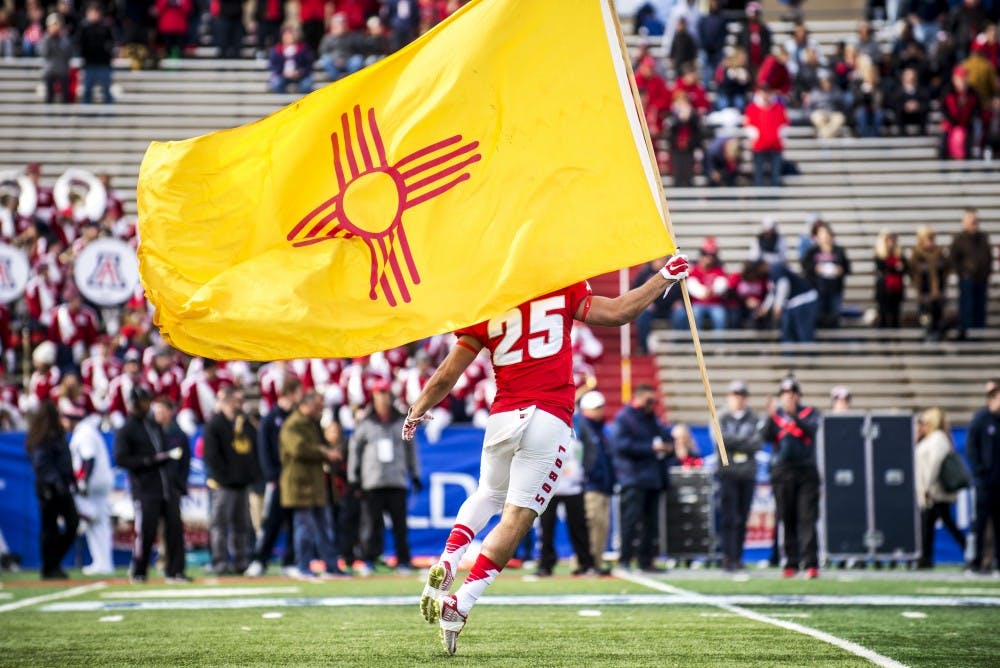Editor's Note: The original version of this story read that the Athletics Department contemplating eliminating or shortening hiring processes to cut costs, which is incorrect. This story has been amended to reflect that change. The Daily Lobo regrets the error and will continue to work diligently to prevent future inaccuracies.
UNM Athletics is deeper in the red after overspending by a little over $1.5 million last year, according to Andrew Cullen of the Office of Planning, Budget and Analysis and Athletics Director Paul Krebs.
That brings the Athletics Department’s cumulative budget deficit to $4.3 million.
Krebs said the University is relieving athletics of $200,000 worth of expenses. The deficit stems from rising costs and a flat revenue stream, he said.
These increased expenses include travel costs, scholarship costs and healthcare costs, he said.
“As the Mountain West has changed membership over the last several years, that’s added significantly to our travel costs,” Krebs said. “Tuition has gone up, room and board, student fees. Whenever those costs go up, those are costs that we literally write a check to the University for - the total scholarship costs for our student athletes. So travel’s gone up, scholarships gone up, a new NCAA rule involving cost of attendance has increased costs as well.”
Funds for UNM cover healthcare increases for most of the University, but the Athletics Department does not have access to that pool of money. Instead, those increases are being paid by the department, he said.
“We found ourselves in a worst case scenario: flat revenue and rising expense,” Krebs said. “We anticipated higher ticket sales than what we actually generated, and I think in some ways that’s a reflection of the economy still struggling in New Mexico,” Krebs said.
Other programs in the same league as UNM receive roughly $6million more in funding through institutional support, student fees and state legislatures, he said.
“When you look at those four buckets of money, we’re next to last at the University of New Mexico in the amount of funds we receive as a combination of those four. So we feel like we’re not getting the support from these external sources like our peers are, and that makes it harder for us,” Krebs said.
It is a difficult time to seek out additional revenue, he said, because the economy in New Mexico is struggling overall. That same struggle is what led to an increase in tuition and student fees for all students this year.
Get content from The Daily Lobo delivered to your inbox
Krebs said the expectation year in and year out is that UNM sports will contend within the conference, as well as nationally, and that individual programs are getting more consistent to achieve that end.
“But I don’t think our funding matches that expectation,” he said. “So something’s gonna have to give or we’re going to continue to struggle to balance the budget.”
Eventually, either the competitive expectations of the department or the funding levels will have to change for the budget to remain financially solid, he said.
Athletics is implementing a range of changes to cut costs and achieve a balanced budget, as well as raise more revenue, Krebs said. This includes the campus wide pause-and-hold policy, a practice of evaluating the necessity of vacant positions before considering new hires, he said.
Athletics is also making changes to concessions to bring in additional revenue, he said. More local food products, as well as the anticipated start of alcohol sales at home games, are expected to help.
Additionally, there will be a craft brew hospitality tent at the south end zone called the Chama River Craft Brewing Corner, which will appeal to the local community at large.
“Craft beer is such a big hot thing in Albuquerque and New Mexico,” Krebs said.
The department also has guaranteed games scheduled for the next eight to 10 years which will bring in much needed revenue.
This year, Rutgers is paying UNM Athletics $9,000 to play on their home turf, and UNM football has agreements to play at Wisconsin, Notre Dame and UCLA.
But those games are about more than bringing in money.
“We’re trying to schedule these games in areas that we recruit that helps us recruit student athletes or potential students to the University,” Krebs said. “We might have larger alumni bases there, so it’s a combination of media exposure, recruiting advantage and revenues.”
Krebs said the deficit will have no effect on student athletes or the student body in general.
“Today we really haven’t made cuts in any of our academic support areas (or) our medical areas and those things that directly impact the athletes,” he said.
According to Krebs, student fees will not necessarily go up, although the department is looking for ways the University can help.
Faith Meyers, a sophomore biology major, was surprised at the Athletics Department deficit because students already pay so much money for athletics, she said. Her friend, Adriana Sandoval, also fund the number surprising.
“I’ve never even been to any sort of UNM sports, so it’s kind of surprising that something that I don’t really know anything about suddenly has this huge debt,” she said.
On the other hand, junior engineering student Paul Yang was not surprised.
“It seems like a lot of departments are likely to run deficits now,” he said, “just because reduced spending overall.”






